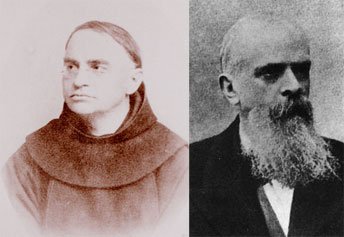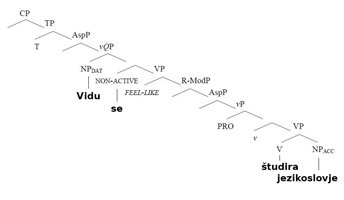Master in Slovene Studies - Linguistics (admission until 2021/22)
| Study programme: | Master in SL studies - Linguistics |
|---|---|
| Main fields of study: | Linguistics |
| Programme code: | 2SI2 |
| Programme cycle: | Second cycle master’s degree |
| Name of the qualification: | Master's |
| Qualification title: | Master's of Slovene Studies |
| Qualification abbreviation: | mag. slov. |
| Final examination: | no |
| Dean: | prof. dr. Franc Marušič |
Programme description
The Masters program IInd level Slovenian studies – direction Linguistics is a 2-year masters program, which gives a wide range of basic knowledge focusing on language, formal linguistics, applied linguistics, interdisciplinary linguistics, and language studies from other more humanistic and social science standpoints.
The most important properties of the program are: focus on individual research work, a number of electives covering all the major linguistic disciplines, the program's international connections and relevance, and constant improving of the program.
The program is evaluated with ECTS (European credit transfer system). This allows the students to enter other comparable programs across Europe (Where ever ECTS is used) during or after they finish this program. Participation in student exchange programs is strongly encouraged at the School of Humanities of University of Nova Gorica.
The second-level Master’s study programme Slovene Studies – Linguistics offers an option of awarding a double degree in Language Science in collaboration with the Department of Linguistics and Comparative Cultural Studies at Ca’Foscari University of Venice.
In order to complete the double degree programme, students need to pass a specified set of obligatory and elective courses at the University of Nova Gorica and at Ca’ Foscari University of Venice. The studies are successfully completed with the student’s defence of the Master’s thesis jointly supervised by professors from both institutions. The students who fulfill all the assigned obligations at both universities will be awarded a Master’s Degree in Slovene Studies – Linguistics by the University of Nova Gorica and a Master’s degree in Language Sciences (Laurea magistrale in Scienze del linguaggio – LM-39) by Ca’ Foscari University of Venice, regardless of the university of first enrollment (alma mater).
Admission requirements
Anybody with a finished 180 ECTS Ist level program in Linguistics, Domestic or Foreign languages, Philology or Classical languages is eligible to enroll in the 1st year of this Master's program.
Candidates who finished a 240 ECTS program in these fields can enroll directly in to the 2nd year of this program.
Candidates with a BA/BS degree (180 or 240 ECTS) in philosophy, psychology, social sciences, mathematics, computer science etc. with more than 45 ECTS of any kind of linguistics are asked to submit their application to the school's study committee.
Applications have to be sent to: Študijska komisija FH UNG, Vipavska c. 13, SI-5000 Nova Gorica, Slovenia, by July 31. We will get back to you by August 25.
In case the number of candidates exceeds the number of available positions, the candidates will be selected based on their GPA from their undergraduate study.
Candidates applying to the double degree programme in Language Science must in addition provide a proof of English language proficiency at B2 level according to CEFR.
Educational and professional goals
The main goal of this program is to give the students a comprehensive knowledge of Linguistics with all of its auxiliary sciences. Graduates of this program will have the knowledge and skills to approach topics related to language and linguistics in a scientific way and to solve them using the most up-to-date methodology.
Access to further studies
With a Master's degree in hand, the students can enroll in any PhD program with limitations imposed by the specific programs. The University of Nova Gorica is preparing two separate Linguistics PhD programs, logical continuations of the two modules of this program.
Assessment
During their 1st year, the students take the three mandatory courses (27 ECTS) which comprise of the three core linguistic areas: Semantics, Syntax, and Phonetics/ Phonology.
The rest of the ECTS is gained through electives divided into two modules. Module Language offers mostly topics related to theoretical linguistics and its applications, module Communication, on the other hand, unifies humanities and social sciences that deal with language and communication.
Each year students select two courses from one module and one course from another module, while the 6 remaining ECTS can be gained with any course offered at a programme of the same level both inside and outside this University.
The Masters thesis, which should summarize the research done, is worth 12 ETCS.
Courses refresh
1. year
| Compulsory courses | Hours | ECTS |
|---|---|---|
| Corpus linguistics I | 90 | 3 |
| Formal Foundations of Linguistic Theory | 180 | 6 |
| Individual research work I | 270 | 9 |
| Phonetics and Phonology | 270 | 9 |
| Pragmatics I | 90 | 3 |
| Psycholinguistics and experimental methods | 180 | 6 |
| Semantics | 270 | 9 |
| Syntax | 270 | 9 |
| General elective courses | Hours | ECTS |
| Analysis of a less familiar language | 180 | 6 |
| Anthropologycal linguistics | 180 | 6 |
| Biolinguistics | 180 | 6 |
| Corpus linguistics II | 90 | 3 |
| Dialectology | 180 | 6 |
| Historical linguistics | 90 | 3 |
| Lexical grammar and semantics | 180 | 6 |
| Logic and analytic philosophy | 180 | 6 |
| Morpho-phonology | 180 | 6 |
| Multilingualism | 180 | 6 |
| Neurolinguistics | 180 | 6 |
| Neuroscience | 90 | 3 |
| Pragmatics II | 90 | 3 |
| Psyholinguistics | 180 | 6 |
| Rhetoric | 180 | 6 |
| Slovene language for foreigners | 180 | 6 |
| Sociolinguistics | 180 | 6 |
| Syntax II | 180 | 6 |
| Text Linguistics | 180 | 6 |
| The basics of artificial intelligence | 90 | 3 |
| Topics in Slovenian linguistics | 180 | 6 |
| Topics in linguistics | 180 | 6 |
2. year
| Compulsory courses | Hours | ECTS |
|---|---|---|
| Individually research work II | 720 | 24 |
| Masters thesis | 360 | 12 |
| General elective courses | Hours | ECTS |
| Analysis of a less familiar language | 180 | 6 |
| Anthropologycal linguistics | 180 | 6 |
| Biolinguistics | 180 | 6 |
| Corpus linguistics II | 90 | 3 |
| Electives | - | 24 |
| Historical linguistics | 90 | 3 |
| Lexical grammar and semantics | 180 | 6 |
| Logic and analytic philosophy | 180 | 6 |
| Morpho-phonology | 180 | 6 |
| Multilingualism | 180 | 6 |
| Neurolinguistics | 180 | 6 |
| Neuroscience | 90 | 3 |
| Pragmatics II | 90 | 3 |
| Psyholinguistics | 180 | 6 |
| Rhetoric | 180 | 6 |
| Slovene as a Foreign Language I | 180 | 6 |
| Slovene as a Foreign Language II | 180 | 6 |
| Sociolinguistics | 180 | 6 |
| Syntax II | 180 | 6 |
| Text Linguistics | 180 | 6 |
| The basics of artificial intelligence | 90 | 3 |
| Topics in Slovenian linguistics | 180 | 6 |
| Topics in linguistics | 180 | 6 |


